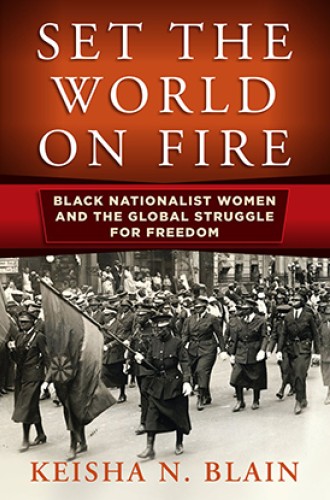The black activist women of 100 years ago
Amy Jacques Garvey, Mittie Maude Lena Gordon, and the “back to Africa” movement
Keisha N. Blain offers a dynamic counterhistory of black women’s involvement in black nationalist activism in the first half of the 20th century. Her compelling narrative illustrates the historical and cultural significance of black women activists and accounts for the reasons they are absent from mainstream histories of black nationalism. By painting a vivid picture of these women—their lives, means of empowerment, nuanced ideologies, and political beliefs—Blain provides an intriguing look into a story that is often oversimplified.
Much of the book narrates the ways black nationalist women pursued racial separatism and emigration to Liberia. After the decline of Marcus Garvey’s Universal Negro Improvement Association, black women leaders like Amy Ashwood, Mittie Maude Lena Gordon, Amy Jacques Garvey, Ethel Waddell, and Maymie De Mena continued to pursue relocation in the hopes of establishing an autonomous black community free from the threat of white supremacy.
Read our latest issue or browse back issues.
However, this was not their only goal. Many of these women simultaneously used the UNIA’s decline as an opportunity to carve out greater space for women’s leadership. Gordon, for instance, founded the Peace Movement of Ethiopia. Whereas in the UNIA women leaders were required to work under a man’s authority, the PME had no such requirements. While the organization upheld the rhetoric of traditional gender roles, stating in its constitution that a woman would only serve as the PME’s president if a suitable man could not be found, the reality was quite different. Gordon effectively ran the organization for more than a decade. Her ability to lead both men and women in the pursuit of black freedom demonstrates her nuanced navigation of the sociopolitical climate of the time.
The conflicting ways black nationalist women pursued power while also espousing traditional gender roles is a key theme in the book. The impact of this contradiction can be seen in Amy Jacques Garvey’s attempt to solidify her husband’s legacy in the 1960s. Arguing that black nationalists of that era owed a debt of gratitude to Marcus Garvey’s activism and ideals, Amy Jacques Garvey largely omitted the history that Blain’s book uncovers. In doing so, Garvey became complicit in the erasure of black women’s important roles in black nationalist activism, including her own. By uncovering this lost history, Blain makes an important intervention into the male-dominated narratives that often accompany discussions of antiracist activism. In this way, her work serves as an intellectual counterpart to the grassroots efforts of women leaders in contemporary groups like Black Lives Matter.
Black nationalist women’s self-erasure isn’t the only controversial aspect of the story that Blain addresses. Many black nationalists of that era, including Marcus Garvey and Gordon, allied themselves with white segregationists to advance their cause. While this reveals an alarming ideological contradiction, it also demonstrates strategic ingenuity and pragmatism. Blain does an excellent job of detailing these methods in a way that is both honest and informative.
Blain also illustrates the definitive ways these activists were more progressive than their mainstream counterparts. For one, groups like the PME built their work on a number of religious and philosophical traditions. They drew from the politics of black Islam and Ethiopianism, while continuing to embrace biblical language and church networks. This aspect of their work demonstrates how blackness can operate as a unifying identity across ideological lines.
These activists also devoted their attention to the needs of working-class black Americans. At the time, this was a radical divergence from the work of the National Association for the Advancement of Colored People and the National Association of Colored Women. These methods were conscious choices made by black nationalist women who were frustrated with the elitism and exclusivity of the NAACP and NACW.
In addition to analyzing their political and ideological legacy, Blain examines what hope looked like for the women who embraced the back to Africa movement. She is careful to balance the idealized image of Africa presented by black nationalists with the historical realities of economic and political turmoil. Still, she manages to capture what Liberia truly meant for these women. Surrounded by antiblack violence, they saw the United States as “irredeemably racist.” In contrast, Liberia represented a utopian haven capable of producing black autonomy, growth, and modernization. The deep desire for emigration is captured by the book’s title, which comes from a statement by Josephine Moody, a member of the UNIA: “We want freedom and justice and the chance to build for ourselves. And if we must set the world on fire . . . we will, like other men, die for the realization of our dreams.”
Set the World on Fire recounts the many ways black women nationalists fought doggedly to pursue those dreams. On the surface, these women’s story is one of failure. Their efforts to facilitate a large-scale emigration to Africa never materialized. The civil rights and Black Power movements overshadowed their work. But Blain resists a surface-level analysis. Instead, she traces the links between these women’s grassroots campaigns and ideological groundwork and the practices of black nationalism that emerged in the 1950s and 1960s. Although their names do not appear in most history books, Blain makes it clear that the black nationalism of the mid-20th century owes much to these women’s overlooked labor.







